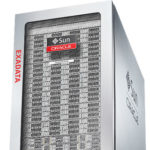Intel announced today that its Optane persistent memory (PMem), in combination with Intel’s open-source distributed asynchronous object storage (DAOS) solution, has taken the no. 1 position on the Virtual Institute for I/O IO500 list for file system performance. Intel said DAOS, with 30 servers of Intel Optane PMem, came in ahead of systems on the […]
Podcast: Reinventing the Memory-Storage Paradigm
In this Chip Chat podcast, Intel Fellow Frank Hady explores the relationship of memory and storage to compute, and outlines how Intel is helping accelerate performance throughout information ecosystems and re-invent the memory storage paradigm in systems. “Since its introduction, 3Dx Point memory, the basis for Intel Optane DC Persistent Memory, has helped mitigate one of the biggest bottlenecks to performance.”
Podcast: Preparing for HPC & AI Convergence in the Enterprise
In this interview, Dr. Meyer discusses AMAX’s focus on appliances for storage, cloud, and hyper-scale integration. Dr. Meyer goes into more depth about why training in AI is now moving to deploying models at the edge, and why 2nd Generation Intel Xeon Scalable processors can be a good fit for such tasks given their advancements in machine learning and security technologies.
Intel Wins IO500 10-node Challenge with DAOS
In this video from SC19, Kelsey Prantis from Intel describes how the DAOS parallel file system won the IO500 10-node Challenge with Intel Optane DC persistent memory. As an all-new parallel file system, DAOS will be a key component of the the upcoming Aurora supercomputer coming to Argonne National Laboratory in 2021.
Intel Optane DC Persistent Memory comes to Oracle Exadata X8M
Today Oracle announced that it is incorporating the high performance capabilities of Intel Optane DC Persistent Memory into its next-generation Oracle Exadata X8M. “Oracle and Intel have integrated cutting-edge persistent memory technologies into the leading enterprise database machine to deliver real-time access to the most mission-critical data. This transcends the boundaries of conventional shared storage systems and servers that simply cannot keep pace with this level of innovation.”
The Confluence of HPC and AI – Intel Customer Use Cases
Vikram Saletore from Intel gave this talk at the MVAPICH User Group. “Intel collaborates with customers and partners worldwide to build, accelerate, scale and deploy their AI applications on Intel based HPC platforms. We share with you our insights on several customer AI use cases we have enabled, the orders of magnitude performance acceleration we have delivered via popular open-source software framework optimizations, and the best-known methods to advance the convergence of AI and HPC on Intel Xeon Scalable Processor based servers. We will also demonstrate how large memory systems help real world AI applications efficiently.”
Baidu to Speed Services with Intel Optane DC Persistent Memory
Today Intel announced Baidu is architecting the in-memory database of its Feed Stream services to harness the high-capacity and high-performance capabilities of Intel Optane DC persistent memory. Paired with 2nd Gen Intel Xeon Scalable processors, building a new memory platform based on Intel Optane DC persistent memory allows Baidu to lower its total cost of ownership (TCO) while delivering more personalized search results to users. Intel and Baidu disclosed details of this deployment and other joint collaborations on Thursday at the 2019 Baidu ABC Summit in Beijing.
Intel Talks at Hot Chips gear up for “AI Everywhere”
Today at Hot Chips 2019, Intel revealed new details of upcoming high-performance AI accelerators: Intel Nervana neural network processors, with the NNP-T for training and the NNP-I for inference. Intel engineers also presented technical details on hybrid chip packaging technology, Intel Optane DC persistent memory and chiplet technology for optical I/O. InsideHPC has got all the details, here, all in one place.
Lenovo and Intel Collaboration to Extend HPC and AI Leadership
Today Intel and Lenovo announced a multiyear collaboration focused on the rapidly growing opportunity in the convergence of HPC and AI to help accelerate solutions for the world’s most challenging problems. Building on the companies’ long-standing partnership in the data center, the multiyear global collaboration will accelerate the convergence of HPC and AI, creating solutions for organizations of all sizes.
DAOS: Scale-Out Software-Defined Storage for HPC/Big Data/AI Convergence
As an all-new parallel file system, DAOS will be a key component of the the upcoming Aurora supercomputer coming to Argonne National Laboratory in 2021. “DAOS is an open source software-defined scale-out object store that provides high bandwidth, low latency, and high I/O operations per second (IOPS) storage containers to HPC applications. It enables next-generation data-centric workflows that combine simulation, data analytics, and AI.”













